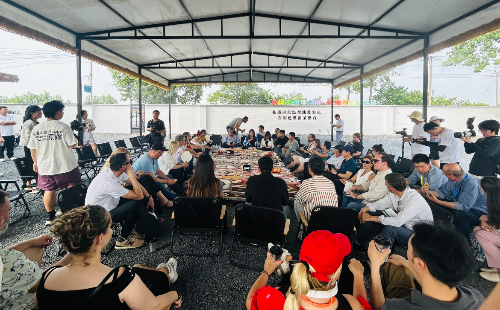Ningbo business ventures into humanoid robot industry
Tuopu, an auto parts manufacturer based in Ningbo, Zhejiang province, recently announced its ambitious plan to enter the humanoid robot segment, with the aim of rivaling Tesla's Optimus in the future.
In a recent investment notice, Tuopu disclosed that it will invest 5 billion yuan ($698.2 million) in establishing a 200-mu (13.33 hectares)production base for robot core components in the Ningbo Economic and Technological Development Zone. Initially, the facility will focus on the research and development, production and sales of robot electric drive systems, with more robot-related products expected to be included in its product portfolio in years to come.
Tuopu's foray into the humanoid robot business is built upon its well-established strengths in research, manufacturing, and efficient collaboration accumulated in the intelligent electric vehicle field, according to the company.
Tuopu is not the only one in Ningbo jumping on the robotic bandwagon. The Ningbo Industrial Internet Research Institute is actively incubating a humanoid robot project and has achieved preliminary progress.
Ningbo has a solid foundation in the rapidly emerging humanoid robot industry supply chain. The city is currently home to over 140 companies involved in key robot components, bodies, and system integration, forming an initial robot industrial chain.
To seek further advancements in the field, an industry insider, who preferred to remain anonymous, pointed out that the city still needs to make breakthroughs in four realms: GPU and CPU chips, robot operating systems, simulation platforms, and general AI training ecology. Strengthening innovation leadership and accelerating localization are crucial for the development of the humanoid robot industry in Ningbo, the insider added.
China as a whole acknowledges the groundbreaking significance of the humanoid robot industry and has been diligently working to establish a competitive advantage against major technological powers.
Last October, the Ministry of Industry and Information Technology issued a document highlighting the expected disruptive potential of humanoid robots, which integrate artificial intelligence, advanced manufacturing, new materials, and other technologies. The document states that humanoid robots have the potential to profoundly transform human production and lifestyle, reshaping the global industrial development landscape.
Preliminary statistics indicate that several domestic behemoths, including iFlytek, Xiaopeng, Fourier and Agibot, have independently released humanoid robots over the past year.
According to Yan Weixin, a doctoral supervisor at the Shanghai Jiao Tong University Robotics Institute, China still has a long way to go in the development and evolution of Chinese humanoid robots, given the historical advantages held by American and Japanese companies such as Boston Dynamics, Tesla, and Asimo in this field.





 play
play